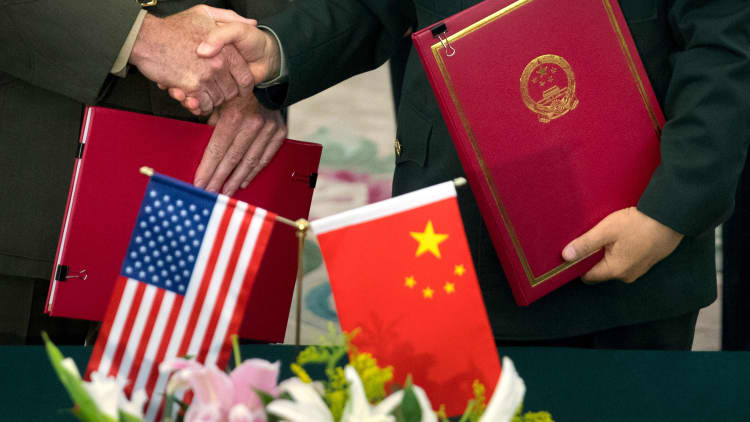
Not a done deal.
That seems to be Wall Street's consensus on the U.S. and China reaching an agreement on "phase one" of a long-awaited trade deal between the world's two largest economies. President Donald Trump also halted the next wave of tariffs that was scheduled to go into effect on Dec. 15 and rolled back some existing duties on Chinese goods.
Market professionals largely welcomed the temporary reprieve this initial step towards a broader agreement would bring to the stock market as stocks seek to end the year on a positive note, with the S&P 500 on track for its best year since 2013.
Here's what three of them, including CNBC's Jim Cramer, said about the agreement on Friday:
Cramer, who hosts "Mad Money," wasn't convinced this meant a full-fledged trade deal was all said and done:
"Let's say you're the Chinese and I'm the president. I come in and I say, 'You know what? Here's what I'll offer: I'll cut all the tariffs in half, and I won't do the December tariff.' That was not offered. And yet, in black and white, the paper says it was. That was never offered, and that's what the president is saying. Now, my experience is that when I say something was never offered and the president confirms it, it was never offered. You could say the whole thing's one big 'fake news,' but it's not. So, whatever the Chinese are saying [is] an agreement, it's not a cut in half of the tariffs. Phase rollback? We don't know what the phase is."
Jeremy Siegel, Russell E. Palmer professor of finance at the University of Pennsylvania's Wharton School, said the phase one deal was an end-of-year gift for markets:
"Just the fact that there's a delay — we're not going to get those 25% tariffs on Dec. 15 — I think is definitely a plus for the market. It would be a bigger plus if we actually got mutual reduction on tariffs. I could see the market up 10% then. But just the delay, that uncertainty, out of the way in the immediate future I think is certainly good for another 5% on the market for the rest of this year. ... Remember, Trump did say we're very close to a deal. We may not get that reduction in tariffs. It may be contingent on them actually doing something. I do believe that this means we're not going to have that tariff ramp up on the 15th. That's going to be delayed. And I think that just that uncertainty out of the way is a bit of a Christmas present for the market going forward this month."
Vincent Reinhart, chief economist and macro strategist at BNY Mellon, said the removal of negative catalysts would help take stocks higher, even as Chinese negotiators may be in a stronger position than investors think:
"On the U.S. side of the table, there has been radical transparency, maybe even a little too much talk as the contestants in the White House put out their view, and so we flip just about every day. On the Chinese side, they release what they want to release when they want to release it. That gives them a competitive advantage. Another fact I like to put into the mix ... is when China was granted accession to the WTO back in 2001, it was the fifth-largest economy. It was nestled in between Germany and Italy, not looking too threatening. Now, it's the second-largest economy. It's got a big footprint on the global stage and therefore, it has some heft in negotiations. ... I think the important part about the deal is reversing some things that were bad — increasing tariffs — and taking off the table something that was going to be even worse — another increase in tariffs. So, it's the absence of a bad thing that's good for the outlook."






